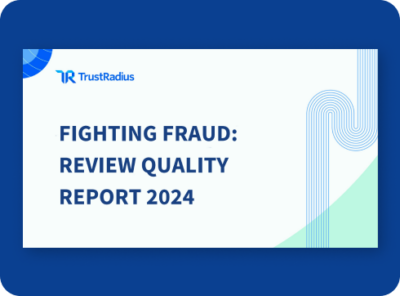
What Is Customer Voice and Why Does it Matter to Marketers?
Why Customer Voice Matters
There’s an interesting irony in business-to-business (B2B) marketing. I’ve built my career by taking software and technology to market, with Fortune 50 companies early in my career, and now with growth-stage companies like TrustRadius. In that role I don’t just market technology, I also buy it…sometimes a lot of it, given that CMO budgets often exceed CIO budgets these days. A B2B CMO is only as good as their tech stack, and that means I’m on the receiving end of a lot of B2B marketing.
I’m both a technology vendor and a technology buyer. It’s kind of like being a filmmaker who’s also a critic. Half of my work life is spent taking technology to market, and the other half is spent being highly skeptical of the marketing that other marketers—my peers—are trying to sell me. That dichotomy is my own personal B2B Disconnect, in a way.
And it leads to a trust gap. 84% of vendors intend to be forthcoming about product limitations, but only 36% of buyers find those vendors to be transparent and forthcoming.
As a vendor, I’m in the 84% who want to be transparent. Every product has flaws, and I want customers to be aware of them in the buying process. That way we end up with customers for whom the product is a good fit, maximizing satisfaction and minimizing buyer’s remorse (and eventual churn).
But as a buyer, I’m also in the 64% who are skeptical of marketing, because I know the rules of the game, and I know how much noise there is in the marketplace. If I responded to every marketing email, inbound BDR call, Webinar invite, or eBook announcement I received, I’d get nothing else done. When you’re trying to rise above the noise, the natural inclination is to talk louder and amp up your claims. If a 30% conversion rate increase doesn’t get attention in the market anymore, maybe you need to promise 40% just to get heard. Marketing quickly becomes an arms race of escalating volume, claims, and big-logo name-dropping.
A Quick Definition of Customer Voice
Customer Voice is simply the honest, unfiltered truth from your customers, including both pros and cons. Case studies can be useful, but they’re also highly curated, as you’ll usually only do case studies about your poster-child happy customers. They’re hard to create at scale, too, despite the fact that your sales team is always asking for one more to cover an additional vertical or persona. Customer references are useful but, again, they’re curated and even harder to scale, so they’re only used in the very late stages of a deal.
Because customer voice is unfiltered, buyers consider it trustworthy. User reviews are typically one of the more trusted sources. Vendor-produced collateral, blogs, and websites, in contrast, rank low for trustworthiness.
Customer Voice Versus Marketing
There’s a place for Marketing in terms of positioning a product, communicating benefits, and building a brand. But it’s not a substitute for customer voice. When I think through the difference, the following points emerge.
| Marketing | Customer Voice | |
| Created by | Marketers | Actual users/customers |
| Objective | Persuade, move to purchase | Inform, share experience and perspective |
| Stance | Biased towards the vendor | Neutral, if there is bias (for example, by selling preferred placements) |
| Language | Often complex – “an eCommerce solution for SMB” | Simple – “They help you sell stuff online” |
| Basis for authority | May rely on 3rd parties (analysts, etc.) to boost credibility | Relies on experience (actual users and customers) |
| Encountered by prospects | At vendor-controlled touchpoints (website, blog, sales interactions) once a prospect has chosen to engage | At the start of the consideration process via search. Throughout the buying process via syndication to touchpoints, as well as by repeat visits to review sites. Post-sale to evaluate experience versus peers |
Moving Forward With Customer Voice
Every marketer knows that building trust within your space is important. Just as much as we know that people will talk to each other when buying something in the B2B space – we all do it. But while there are steps we can take to be more truthful within our own marketing, there is only so much trust we can build with our own voices.
Customer voice can be that bridge to reducing the trust gap and address the healthy skepticism that we experience, without the need to increase the volume. And that helps to build trust too.
To dive deeper into customer voice and the current state of B2B software buying, check out the 2019 B2B Buying Disconnect study.




